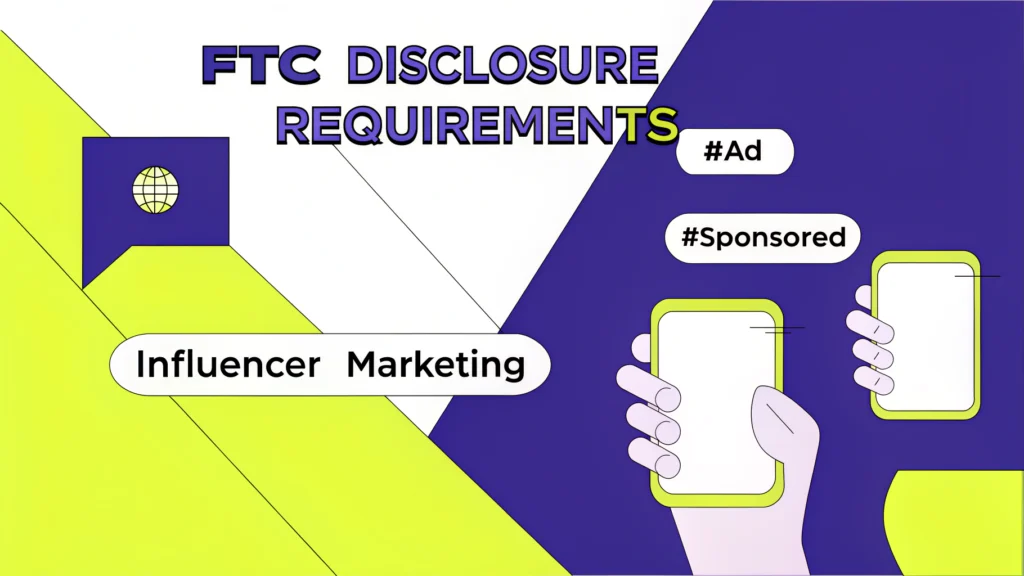Overview
This article provides a comprehensive guide to mastering FTC disclosures in auto content, focusing on compliance with Federal Trade Commission regulations. It outlines key strategies for effective disclosure practices, including:
- The use of clear language
- Standard hashtags
- Regular audits
These strategies not only ensure legal adherence but also foster trust and enhance engagement with audiences, particularly in the realm of influencer marketing.
Introduction
Navigating the intricate landscape of influencer marketing requires more than just creativity; it demands a thorough understanding of the Federal Trade Commission’s (FTC) disclosure requirements. As brands increasingly rely on influencers to connect with consumers, the importance of transparent communication cannot be overstated. This article delves into the essential steps for mastering FTC disclosures in auto content, offering actionable insights that not only ensure compliance but also enhance audience trust. However, with evolving regulations and the complexities of influencer partnerships, how can brands effectively balance compliance with engaging content?
Understand FTC Disclosure Requirements
To effectively master FTC requirements, begin by familiarizing yourself with the Federal Trade Commission’s guidelines. The FTC mandates that any material connection between an endorser and a brand be disclosed clearly and conspicuously. This requirement encompasses any form of compensation, free products, or other incentives provided to influencers. Key considerations include:
- Material Connections: Understand what constitutes a material connection, which can include monetary compensation, complimentary products, or any benefits that may influence the endorsement.
- Clear Language: Use straightforward language that your audience can easily comprehend. Avoid ambiguous terms like ‘collab’ or ‘partnership’ without providing context.
- Placement: Ensure announcements are prominently positioned for maximum visibility. For instance, placing a notice at the beginning of a post or video is considerably more effective than relegating it to the end.
Understanding how to handle is crucial for developing compliant and effective marketing strategies. Brands that understand how to handle FTC disclosures in auto content not only foster trust with their audience but also enhance their overall marketing effectiveness. By learning how to handle FTC disclosures in auto content within your long-term organic strategy, you can establish genuine connections that result in ongoing involvement and quantifiable growth. For example, companies that have successfully implemented FTC disclosure guidelines have seen improved engagement rates, with influencer-generated content achieving engagement rates 4.7 times greater than non-influencer content. Furthermore, 44% of Gen Zers have made a purchase based on a recommendation from a social media personality, underscoring the significance of marketing through these figures and the necessity of adherence in engaging this demographic. The influencer marketing industry reached a market value of $21.1 billion in 2023, highlighting the imperative for adherence to FTC guidelines to capitalize on this significant opportunity.
Implement Clear Disclosure Practices
To implement clear disclosure practices that contribute to long-term trust and community building, consider the following actionable steps:
- Use Standard Hashtags: Start your posts with widely recognized hashtags such as #ad or #sponsored. This practice provides immediate clarity for your audience regarding the sponsored nature of the content, aligning with FTC guidelines and fostering transparency.
- Create a Template: Develop a standard information template that can be adapted for various platforms. This method ensures consistency throughout all your content, facilitating compliance for influencers with transparency obligations and strengthening your brand’s dedication to openness.
- Educate Influencers: Equip influencers with comprehensive guidelines on disclosing their relationships with your brand. This includes examples of effective disclosures and emphasizes the importance of transparency in building audience trust. As Elise Dopson notes, “84.8% find influencer marketing effective and 36% state that influencer content outperforms brand-created content,” underscoring the need for clear communication.
- Visual Cues: In video content, utilize on-screen text or graphics to indicate sponsorship. This approach is particularly effective on platforms like Instagram Stories or TikTok, where visual interaction is key. Notably, Reels from Instagram influencers achieved the highest engagement rate at 2.08%, highlighting the significance of effective disclosure practices in maximizing engagement.
By learning how to handle FTC disclosures in auto content, you not only comply with FTC regulations but also build trust with your audience, enhancing the effectiveness of your marketing campaigns. This trust is essential for cultivating a loyal audience over time, a key aspect of a successful . Additionally, consider leveraging tools like Dash to manage content and campaigns effectively.

Monitor Influencer Compliance and Engagement
To effectively monitor influencer compliance and engagement, consider implementing the following strategies:
- Regular audits should be conducted of influencer content on a monthly or quarterly basis to learn how to handle FTC disclosures in auto content and ensure compliance with FTC guidelines. This proactive approach not only helps maintain transparency but also reinforces accountability within your campaigns.
- Interaction Metrics: Monitor interaction metrics for both sponsored and organic posts to assess the effectiveness of your collaborations. Participation rates exceeding 10% typically indicate a strong connection between the audience and the content, which is crucial for maximizing impact.
- Feedback Loop: Establish a feedback loop with influencers to discuss their experiences and any challenges related to sponsorship disclosures. This ongoing dialogue can enhance future collaborations and foster stronger partnerships.
- Use Monitoring Tools: Leverage to track mentions and interactions related to your brand. These tools swiftly identify regulatory issues and provide insights into audience interactions, ensuring that your partnerships with promoters remain effective and legally sound.
By actively overseeing adherence and engagement, you can ensure that your influencer partnerships not only comply with legal standards but also learn how to handle FTC disclosures in auto content to generate significant outcomes for your brand.

Address Common Challenges in FTC Compliance
To effectively tackle common challenges in FTC compliance, consider implementing the following strategies:
- Many brands encounter difficulties with the intricacies of FTC guidelines, particularly regarding how to handle ftc disclosures in auto content. To address this, prioritize for your marketing team, ensuring that all members are well-versed in the requirements. As Steve Alder notes, “Healthcare organizations are improving in identifying insider breaches and notifying those incidents to the Office for Civil Rights,” underscoring the significance of thorough training in regulations.
- Irregular reveals: Irregular revealing methods among influencers can complicate how to handle ftc disclosures in auto content. Maintain clear channels of communication with influencers, emphasizing the importance of regular transparency, and equip them with the necessary tools to ensure compliance. A robust security management process, including risk analysis and actioned remediation plans, is essential in this context.
- Platform-Specific Guidelines: Each social media platform may impose distinct guidelines regarding disclosures. It is crucial to familiarize yourself with how to handle ftc disclosures in auto content and other platform-specific regulations to ensure adherence across all channels, thereby minimizing the risk of violations. Regular updates and training can keep your team informed about these evolving guidelines.
- Crisis Management: Prepare a comprehensive crisis management plan to address potential regulatory issues. This plan should outline steps for public communication and strategies to mitigate any damage to your brand’s reputation. As emphasized in the case study on ‘Training on Patient Access and Accounting Requests,’ effective training ensures prompt and precise responses to regulatory challenges.
By proactively addressing these challenges, you can strengthen your compliance efforts and uphold a positive brand image.

Conclusion
Mastering FTC disclosures in auto content is not merely a regulatory necessity; it is a strategic advantage that can significantly elevate brand trust and engagement. By thoroughly understanding and implementing the Federal Trade Commission’s guidelines, brands can adeptly navigate the complexities of influencer marketing while fostering authentic connections with their audience. The importance of clear, conspicuous disclosures cannot be overstated, as they are essential for building credibility and enhancing the effectiveness of marketing campaigns.
This article outlines essential practices for achieving compliance, including:
- The strategic use of standard hashtags
- The creation of adaptable templates
- The education of influencers
- The employment of visual cues in content
Furthermore, it emphasizes the critical need for ongoing monitoring of influencer compliance and engagement through regular audits and feedback loops. Addressing common challenges, such as irregular disclosures and platform-specific regulations, further solidifies a brand’s commitment to transparency and accountability.
Ultimately, the significance of FTC disclosures in automotive marketing extends far beyond mere compliance; it is fundamentally about cultivating lasting relationships with consumers. As the influencer marketing landscape continues to evolve, brands must prioritize transparency—not only to meet legal requirements but also to harness the full potential of their marketing efforts. Embracing these practices will not only mitigate risks but also position brands for success in an increasingly competitive environment.
Frequently Asked Questions
What are the FTC disclosure requirements?
The FTC requires that any material connection between an endorser and a brand be disclosed clearly and conspicuously. This includes any form of compensation, free products, or other incentives provided to influencers.
What constitutes a material connection?
A material connection can include monetary compensation, complimentary products, or any benefits that may influence the endorsement.
How should disclosures be communicated?
Disclosures should use clear and straightforward language that is easily understood by the audience. Avoid ambiguous terms like ‘collab’ or ‘partnership’ without providing context.
Where should disclosures be placed for maximum visibility?
Disclosures should be prominently positioned, ideally at the beginning of a post or video, rather than at the end, to ensure they are easily noticed.
Why is understanding FTC disclosures important for brands?
Understanding how to handle FTC disclosures fosters trust with the audience and enhances overall marketing effectiveness. It helps establish genuine connections, leading to ongoing involvement and measurable growth.
What impact do FTC disclosures have on engagement rates?
Companies that implement FTC disclosure guidelines have seen improved engagement rates, with influencer-generated content achieving engagement rates 4.7 times greater than non-influencer content.
How influential are social media personalities on purchasing decisions?
44% of Gen Zers have made a purchase based on a recommendation from a social media personality, highlighting the importance of influencer marketing.
What is the market value of the influencer marketing industry in 2023?
The influencer marketing industry reached a market value of $21.1 billion in 2023, emphasizing the need for adherence to FTC guidelines to capitalize on this significant opportunity.

